
By Prof. Raphael Nyarkotey Obu
Aloe vera was officially listed as a purgative and skin protectant by the U.S. pharmacopoeia in 1820 and was clinically used in the 1930s for the treatment of radiotherapy burns to the skin and mucous membranes.
The enzymes found in aloe vera break down the proteins that we eat into amino acids and turn the enzymes into fuel for every cell in the body, which enables the cells to function properly. The bradykinase in aloe vera stimulates the immune system and kills infections. Zinc is also an important component in this beneficial plant — making it a great natural tool for combating zinc deficiency.
One study(Sujatha et al. 2014) found that aloe vera is being studied for its uses in dentistry; this is because it has proved to be an antiseptic, anti-inflammatory, antiviral, and antifungal plant, and it’s very good in building up the immune system without causing allergic reactions or side effects.
Today, cosmetic companies commonly add sap or other derivatives from aloe vera to a range of products, including makeup, soaps, sunscreens, incense, shaving cream, shampoos, tissues, and moisturizers. The plant is even used commercially as an ingredient in yogurts, beverages, and desserts.
Aloe vera is one of approximately 420 species of the genus Aloe. The botanical name of aloe vera is Aloe barbadensis miller, and it belongs to the Liliaceae family. It’s a perennial, xerophytic, succulent plant that’s green and has triangular, fleshy leaves with serrated edges.
The geographic origin of aloe vera is believed to be in Sudan, and it was later introduced in the Mediterranean region and most other warm areas of the world, including Africa, Asia, India, Europe, and America.
In this article, I explore the science behind aloe vera.
Aloe vera, Science
Nutrient Content
Aloe vera is considered to be the most biologically active of the Aloe species; astonishingly, more than 75 potentially active components have been identified in the plant, including vitamins, minerals, saccharides, amino acids, anthraquinones, enzymes, lignin, saponins, and salicylic acids. It provides 20 of the 22 human-required amino acids and eight of the nine essential amino acids.
• Aloe vera contains antioxidant vitamins A, C, and E — plus vitamin B12, folic acid, and choline.
• It contains eight enzymes, including aliiase, alkaline phosphatase, amylase, bradykinase, carboxypeptidase, catalase, cellulase, lipase and peroxidase.
• The minerals present include calcium, copper, selenium, chromium, manganese, magnesium, potassium, sodium,and zinc.
• It provides 12 anthraquinones — or compounds known as laxatives. Among these are aloin and emodin, which act as analgesics, antibacterials, and antivirals.
• Four fatty acids are present, including cholesterol, campesterol, beta-sitosterol, and lupeol — all providing anti-inflammatory results.
• The hormones called auxins and gibberellins are present; they help with healing wounds and have anti-inflammatory properties.
• Aloe vera provides sugars, such as monosaccharides (glucose and fructose) and polysaccharides.
Skin conditions and improved skin appearance
Some studies(Luo et al. 2018; Kudłacik-Kramarczyk et al. 2021) held that due to its anti-inflammatory properties, aloe vera is a potential treatment for burns and other skin disorders like atopic dermatitis.
Some studies( Kudłacik-Kramarczyk et al. 2021; Ro et al. 2020) believed that most of the benefits of aloe vera on skin health are seen when it’s applied topically, rather than consumed as a drink.
One human study(Kaminaka et al. 2020) found that taking 40 mcg of aloe sterol per day for 12 weeks improved skin elasticity in a group of men under age 46.
Another human study(Tanaka et al. 2020) also found that consuming aloe vera improved collagen production and reduced the appearance of wrinkles in a group of women over age 40.
One should take notice that in both of these studies, aloe was consumed as a supplement, not juice. Additionally, while this research is promising, it’s not conclusive, and more human trials are needed.
Pre-diabetes treatment
Some studies(Foster et al. 2011; Suksomboon et al. 2016) found that both the gel and juice from aloe vera could lower fasting blood sugar levels in people with type 2 diabetes.
Also(Suksomboon et al. 2016; Zhang et al. 2016) reviews found that drinking aloe vera juice showed no impact on fasting blood sugar in people with type 2 diabetes — though it did in those with pre-diabetes.
A previous study(Alinejad-Mofrad et al. 2015) that aloe juice improved both blood sugar and blood fatty acid levels in those with pre-diabetes.
(Foster et al. 2011) confirmed two related clinical trials where 72 diabetic women without drug therapy were administered one tablespoon of aloe vera gel or a placebo for six weeks. Blood glucose and serum triglyceride levels were significantly decreased with aloe vera treatment.
In the second trial, the effects of aloe vera gel or placebo in combination with glibenclamide, a commonly prescribed antidiabetic medication, were investigated; this, also, resulted in significant reductions in blood glucose and serum triglyceride concentrations in the aloe vera group.
A previous human study(Okyar et al. 2001) also confirmed that aloe vera is a potential diabetic natural drug.
Digestive issues
Foster et al. (2011) found that aloe vera juice has anthraquinoneglycosides. These are plant compounds with laxative effects that could help relieve constipation.
In 2002, the Food and Drug Administration (FDA) stopped the approval status of aloe vera as a laxative for over-the-counter sales, as they hadn’t been tested to confirm their safety and efficacy.
This notwithstanding, the use of aloe latex as a laxative is well-researched. The anthraquinones present in the latex create a potent laxative that increases intestinal water content, stimulates mucus secretion, and increases intestinal peristalsis, which are contractions that break down food and mix the chyme.
Some human studies(Panahi et al. 2015; Størsrud et al. 2015) found that aloe vera syrup may help treat and reduce the symptoms of gastroesophageal reflux disease (GERD) and treat irritable bowel syndrome (IBS). Gastroesophageal reflux disease (GERD) is a digestive disorder that often results in heartburn. An IBD-An intestinal disorder causing pain in the stomach, wind, diarrhoea, and constipation.
In one human study, (Khedmat et al. 2013) found that 30 milliliters of aloe vera juice twice a day decreased the level of discomfort in 33 patients with irritable bowel syndrome.
Flatulence also decreased for the participants, but stool consistency, urgency, and frequency remained the same. In the case of a meta-analysis(Hong et al. 2018) found that when 151 IBS patients used aloe vera, there was a significant difference for patients who used aloe vera compared to those with placebo regarding improvement in IBS symptoms.
Aloe vera juice has also been used to soothe and heal stomach ulcers because it has antibacterial agents and natural healing properties that can restore the stomach lining back to health.
Dental and oral health
Some animal studies (Sujatha et al. 2014) also found that aloe vera offers antibacterial properties and could support the treatment of some dental and oral conditions.
Apart from that, a human study(Anuradha et al. 2017) in 74 people with oral submucous fibrosis — a chronic condition that causes pain and inflammation in the mouth — showed that taking 1 ounce (30 mL) of aloe vera juice twice daily for 3 months was as effective as traditional treatments like hydrocortisone injections.
A previous human study(Sahebjamee et al. 2015)also found that aloe vera mouthwash effectively reduced the severity and pain related to oral mucositis— a common side effect of chemotherapy and radiation treatments — in individuals with head and neck cancers.
Another human study(Mansouri et al. 2016) in 64 people with cancer found that using an aloe vera mouthwash solution 3 times daily for 14 days helped reduce the occurrence and associated pain of chemotherapy-induced stomatitis, which is an infection in the mouth.
Other preliminary studies(Fallahi et al. 2016; Gupta et al. 2014) also found that aloe vera mouthwash may help fight dental plaque and manage pain and swelling following oral surgery.
These studies (Anuradha et al. 2017; Sahebjamee et al. 2015) suggest that aloe vera juice could offer an alternative approach to treatments for certain dental and oral conditions.
Dosage
These recommended aloe vera doses are based on scientific research and publications(Dr. Axe.com). Make sure to read the label on each product before using it, and notify your doctor if you experience any side effects.
• For constipation, take 100–200 milligrams of aloe vera daily.
• For wound healing, psoriasis, and other skin infections, use 0.5 percent aloe extract cream three times daily.
• For dental plaque and gum disease, use a toothpaste that contains aloe vera for 24 weeks.
• For high cholesterol, take one capsule of aloe vera containing 300 milligrams twice daily for two months.
• For irritable bowel syndrome, take 100 milliliters of aloe vera drink or juice twice daily for four weeks.
• For skin burns or sunburns, use a 97.5 percent aloe gel on the burn until it’s healed.
• For dry scalp or dandruff, add a teaspoon of aloe gel to your shampoo.
• To protect your skin from infection and bacteria, add a teaspoon of aloe gel to your hand lotion.
Warnings
Dr. Axe.com notes that aloe latex should not be taken in high doses because it may cause adverse side effects, such as stomach pain and cramps. Long-term use of large amounts of aloe latex might also cause diarrhea, kidney problems, blood in the urine, low potassium, muscle weakness, weight loss, and heart issues.
Don’t take aloe vera, either gel or latex, if you’re pregnant or breastfeeding. There are some reports of aloe causing miscarriage and birth defects. Children younger than 12 years old may experience abdominal pain, cramps, and diarrhea, so I don’t recommend aloe vera for child use either.
• If you have diabetes, some research suggests aloe might lower blood sugar, so if you take it by mouth and you have diabetes, monitor your blood sugar levels closely.
• If you have intestinal conditions such as Crohn’s disease, ulcerative colitis, or obstruction, don’t take aloe latex because it’s a bowel irritant.
• Don’t take aloe latex if you have hemorrhoids because it could make the condition worse.
• High doses of aloe latex have been linked to kidney failure and other serious conditions, so don’t take it if you have kidney problems.
• Aloe might affect blood sugar levels and could interfere with blood sugar control during and after surgery. Stop taking it at least two weeks before a scheduled surgery.
• If you take digoxin (Lanoxin), don’t use aloe latex because it works as a stimulant laxative and decreases potassium levels in the body; low potassium levels can increase the risk of side effects when taking this medication.
Before taking aloe vera, consult your doctor if you take the following medications:
• Diabetes medications
• Sevoflurane (Ultane)
• Stimulant laxatives
• Warfarin (Coumadin)
• Diuretic medications (water pills)
Take Home
Research has indicated that aloe vera may benefit your skin, dental, oral, and digestive health. It may even improve blood sugar control.
It’s easy to find aloe vera products — including aloe gel, latex, juice, and extracts — in Nyarkotey Herbal Mall. The Herbal Mall stocks products that are made by a reputable company to ensure that the extraction and processing methods don’t reduce the plant’s therapeutic properties.
The processing method has the largest effect on the number and amount of active ingredients in an aloe vera product. The commercial production process of aloe vera products typically involves the crushing, grinding, or pressing of the whole leaf to produce aloe vera juice, followed by various steps of filtration and stabilization to achieve the desired extract.
NB:
Prof. Nyarkotey has strict sourcing guidelines and relies on peer-reviewed studies, academic research institutions, and medical associations to justify his write-ups. My articles are for educational purposes and do not serve as Medical advice for Treatment. I aim to educate the public about evidence-based scientific Naturopathic Therapies.
The writer is a Professor of Naturopathic Healthcare, a Medical Journalist, and a science writer. President, NyarkoteyUniversity College of Holistic Medicine & Technology (NUCHMT)/African Naturopathic Foundation, Ashaiman, Ghana. E. mail: professor40naturopathy@gmail.com. Visit-profnyarkotey.com for more.
Nyarkotey Herbal Mall houses quality natural products from all over the world. You can now buy all your vitamins, herbs, supplements, homeopathy drugs, Ayurveda drugs and more. It is located at Amrahia, Dodowa Road, behind Potbelly. We have qualified Naturopathic doctors managing the Natural Medicine Mall. We do deliveries as well. Call on: +233207844338/0541090045. Special consultation is also available for diabetics, hypertensive and cancer patients, and many more
References
1. Luo X, Zhang H, Wei X, Shi M, Fan P, Xie W, Zhang Y, Xu N. Aloin Suppresses Lipopolysaccharide-Induced Inflammatory Response and Apoptosis by Inhibiting the Activation of NF-κB. Molecules. 2018 Feb 26;23(3):517. doi: 10.3390/molecules23030517. PMID: 29495390; PMCID: PMC6017010.
2. Kudłacik-Kramarczyk S, Głąb M, Drabczyk A, Kordyka A, Godzierz M, Wróbel PS, Krzan M, Uthayakumar M, Kędzierska M, Tyliszczak B. Physicochemical Characteristics of Chitosan-Based Hydrogels Containing Albumin Particles and Aloe vera Juice as Transdermal Systems Functionalized in the Viewpoint of Potential Biomedical Applications. Materials (Basel). 2021 Oct 6;14(19):5832. doi: 10.3390/ma14195832. PMID: 34640229; PMCID: PMC8510356.
3. Ro HS, Jang HJ, Kim GR, Park SJ, Lee HY. Enhancement of the Anti-Skin Wrinkling Effects of Aloe arborescens Miller Extracts Associated with Lactic Acid Fermentation. Evid Based Complement Alternat Med. 2020 Jun 2;2020:2743594. doi: 10.1155/2020/2743594. PMID: 32565850; PMCID: PMC7288207.
4. Kaminaka C, Yamamoto Y, Sakata M, Hamamoto C, Misawa E, Nabeshima K, Saito M, Tanaka M, Abe F, Jinnin M. Effects of low-dose Aloe sterol supplementation on skin moisture, collagen score and objective or subjective symptoms: 12-week, double-blind, randomized controlled trial. J Dermatol. 2020 Sep;47(9):998-1006. doi: 10.1111/1346-8138.15428. Epub 2020 Jun 8. PMID: 32515040; PMCID: PMC7496846.
5. Tanaka M, Misawa E, Yamauchi K, Abe F, Ishizaki C. Effects of plant sterols derived from Aloe vera gel on human dermal fibroblasts in vitro and on skin condition in Japanese women. Clin Cosmet InvestigDermatol. 2015 Feb 20;8:95-104. doi: 10.2147/CCID.S75441. PMID: 25759593; PMCID: PMC4345938.
6. Foster M, Hunter D, Samman S. Evaluation of the Nutritional and Metabolic Effects of Aloe vera. In: Benzie IFF, Wachtel-Galor S, editors. Herbal Medicine: Biomolecular and Clinical Aspects. 2nd edition. Boca Raton (FL): CRC Press/Taylor & Francis; 2011. Chapter 3. Available from: https://www.ncbi.nlm.nih.gov/books/NBK92765/
7. Suksomboon N, Poolsup N, Punthanitisarn S. Effect of Aloe vera on glycaemic control in prediabetes and type 2 diabetes: a systematic review and meta-analysis. J Clin Pharm Ther. 2016 Apr;41(2):180-8. doi: 10.1111/jcpt.12382. Epub 2016 Mar 23. PMID: 27009750.
8. Zhang Y, Liu W, Liu D, Zhao T, Tian H. Efficacy of Aloe Vera Supplementation on Prediabetes and Early Non-Treated Diabetic Patients: A Systematic Review and Meta-Analysis of Randomized Controlled Trials. Nutrients. 2016 Jun 23;8(7):388. doi: 10.3390/nu8070388. PMID: 27347994; PMCID: PMC4963864.
9. Alinejad-Mofrad S, Foadoddini M, Saadatjoo SA, Shayesteh M. Improvement of glucose and lipid profile status with Aloe vera in pre-diabetic subjects: a randomized controlled-trial. J Diabetes Metab Disord. 2015 Apr 9;14:22. doi: 10.1186/s40200-015-0137-2. PMID: 25883909; PMCID: PMC4399423.
10. Foster M, Hunter D, Samman S. Evaluation of the Nutritional and Metabolic Effects of Aloe vera. In: Benzie IFF, Wachtel-Galor S, editors. Herbal Medicine: Biomolecular and Clinical Aspects. 2nd edition. Boca Raton (FL): CRC Press/Taylor & Francis; 2011. Chapter 3. Available from: https://www.ncbi.nlm.nih.gov/books/NBK92765
11. Panahi Y, Khedmat H, Valizadegan G, MohtashamiR, Sahebkar A. Efficacy and safety of Aloe vera syrup for the treatment of gastroesophageal reflux disease: a pilot randomized positive-controlled trial. J TraditChin Med. 2015 Dec;35(6):632-6. doi: 10.1016/s0254-6272(15)30151-5. PMID: 26742306.
12. Størsrud S, Pontén I, Simrén M. A Pilot Study of the Effect of Aloe barbadensis Mill. Extract (AVH200®) in Patients with Irritable Bowel Syndrome: a Randomized, Double-Blind, Placebo-Controlled Study. J Gastrointestin Liver Dis. 2015 Sep;24(3):275-80. doi: 10.15403/jgld.2014.1121.243.sst. PMID: 26405698.
13. Khedmat H, Karbasi A, Amini M, Aghaei A, Taheri S. Aloe vera in treatment of refractory irritable bowel syndrome: Trial on Iranian patients. J Res Med Sci. 2013 Aug;18(8):732. PMID: 24379854; PMCID: PMC3872617.
14. Hong SW, Chun J, Park S, Lee HJ, Im JP, Kim JS. Aloe vera Is Effective and Safe in Short-term Treatment of Irritable Bowel Syndrome: A Systematic Review and Meta-analysis. J NeurogastroenterolMotil. 2018 Oct 1;24(4):528-535. doi: 10.5056/jnm18077. PMID: 30153721; PMCID: PMC6175553.
15. Okyar A, Can A, Akev N, Baktir G, Sütlüpinar N. Effect of Aloe vera leaves on blood glucose level in type I and type II diabetic rat models. Phytother Res. 2001 Mar;15(2):157-61. doi: 10.1002/ptr.719. PMID: 11268118.
16. Anuradha A, Patil B, Asha VR. Evaluation of efficacy of aloe vera in the treatment of oral submucous fibrosis – a clinical study. J Oral PatholMed. 2017 Jan;46(1):50-55. doi: 10.1111/jop.12463. Epub 2016 Jun 17. PMID: 27314762.
17. Sahebjamee M, Mansourian A, HajimirzamohammadM, Zadeh MT, Bekhradi R, Kazemian A, Manifar S, Ashnagar S, Doroudgar K. Comparative Efficacy of Aloe vera and Benzydamine Mouthwashes on Radiation-induced Oral Mucositis: A Triple-blind, Randomised, Controlled Clinical Trial. Oral Health Prev Dent. 2015;13(4):309-15. doi: 10.3290/j.ohpd.a33091. Erratum in: Oral Health PrevDent. 2016;14(3):274. Mohammad, Haji Mirza Mohammad [corrected to Hajimizamohammad, Mohammad]. PMID: 25431805.
18. Mansouri P, Haghighi M, Beheshtipour N, Ramzi M. The Effect of Aloe Vera Solution on Chemotherapy-Induced Stomatitis in Clients with Lymphoma and Leukemia: A Randomized Controlled Clinical Trial. Int J Community Based Nurs Midwifery. 2016 Apr;4(2):119-26. PMID: 27218109; PMCID: PMC4876780.
19. Gupta RK, Gupta D, Bhaskar DJ, Yadav A, Obaid K, Mishra S. Preliminary antiplaque efficacy of aloe veramouthwash on 4 day plaque re-growth model: randomized control trial. Ethiop J Health Sci. 2014 Apr;24(2):139-44. doi: 10.4314/ejhs.v24i2.6. PMID: 24795515; PMCID: PMC4006208.
20. Anuradha A, Patil B, Asha VR. Evaluation of efficacy of aloe vera in the treatment of oral submucous fibrosis – a clinical study. J Oral PatholMed. 2017 Jan;46(1):50-55. doi: 10.1111/jop.12463. Epub 2016 Jun 17. PMID: 27314762.





